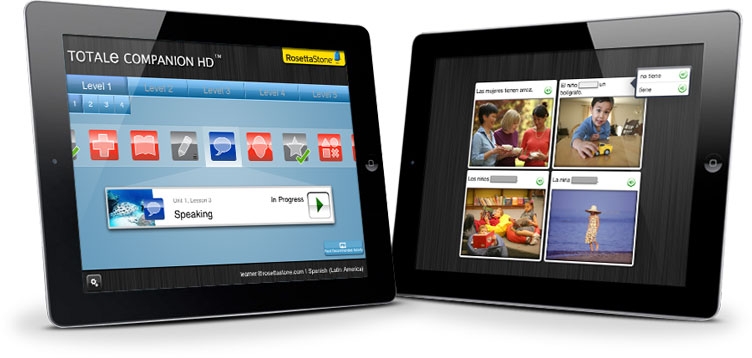Rosetta Stone arrives on iPad; language learning takes logical leap

If you've ever used Rosetta Stone, you know how powerful its simple user experience is at helping you learn how to speak a foreign language.
On Thursday, the company announced a companion iPad app (called, appropriately, "Companion HD") for its conventional and pricey yellow language software suite. After using it this afternoon in a demo in Midtown New York, it's expressly clear to me that mobile devices are the next logical step in language learning.
We aren't in the habit of writing about new apps here at ZDNet, and you wouldn't believe how many e-mails I get from PR reps stating that their client's app is the next best thing since, well, the iPad. Ninety-nine point nine percent of them are rubbish, but Rosetta Stone's app demonstrates that language learning may actually make more sense on-the-go.
First, a primer: Rosetta Stone's TOTALe (pronounced "toe-tal-ee") suite of software is both local (compact discs) and in the cloud. In consists of three main sections: "Course," the company's bread-and-butter language lessons; "Studio," where you videochat with a native language instructor; and "World," where you practice your language skills by playing interactive games with other Rosetta Stone users.
(If you're interested, I reviewed a version of the suite in Jan. 2010 on the Toybox blog.)
The new iPad app, a free companion to the package (but not functional on its own), effectively brings the "Course" section to the tablet. It's the one that makes the most sense, technically and experientially: in this section, you click on (or speak) the correct answer.
Using the app this afternoon, it's a vastly mproved experience. Why? Because the desktop and input device of a conventional computer fade away. You push with your finger. You avoid distraction from your corporate e-mail. You learn on your couch or patio, without burning the tops of your thighs. And you're not hunched over your keyboard like some wretched primate.
The experience is so natural that it's almost as if the desktop edition is the odd-man-out. Why use a mouse, when you can touch the correct answer? It's one less layer of technology.
Additionally, pushing things to the cloud also allows the company to rapidly iterate. Whether mobile or desktop, it's much easier for Rosetta Stone to understand how users are using their software, then make changes.
All this means language learning through now has been surprisingly rudimentary. Now, these companies can collect tons of data to improve their products. And as consumers and enterprise customers increase tablet use -- often at the expense of their laptops -- it also means Rosetta Stone's product is moving along in tandem with the trend, no complete rethink necessary.
Unfortunately, while you can still use the suite's discs once your TOTALe account expires, that's not the case for the app. I understand why that decision was made -- protect revenues and nudge customers to the subscription-based cloud -- but I still think the "Course" section must be permanently accessible. (If only frozen in time, barred from new updates.) Not to mention the persistent online-offline issues with mobile devices.
Nevertheless, the facility with which this software functions on a tablet device -- especially with voice recognition, quickly becoming a major input method for mobile devices -- makes me forget about the laptop version entirely. It's exciting to see software find a natural home like this.
Which means the next time you're sitting in your hotel room in Mumbai, looking to brush up on your Hindi before you meet the company's new IT department, you can do it reclined on the sofa, whiskey neat in hand. Now that's what I call language learning.
